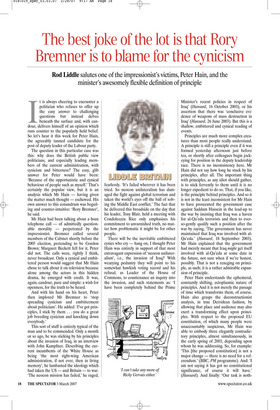The best joke of the lot is that Rory Bremner is to blame for the cynicism
Rod Liddle salutes one of the impressionist’s victims, Peter Hain, and the minister’s awesomely flexible definition of principle It is always cheering to encounter a politician who refuses to offer up the easy answer to challenging questions but instead delves beneath the surface and, with candour, delivers himself of an opinion which runs counter to the popularly held belief. So let’s hear it this week for Peter Hain, the agreeably tanned candidate for the post of deputy leader of the Labour party.
The question in this particular case was this: why does the British public view politicians, and especially leading members of the current administration, with cynicism and bitterness? The easy, glib answer for Peter would have been: ‘Because of the opportunistic and cynical behaviour of people such as myself.’ That’s certainly the popular view, but it is an analysis which Mr Hain — having given the matter much thought — eschewed. His own answer to this conundrum was beguiling and counter-intuitive: ‘Rory Bremner’, he said.
Mr Hain had been talking about a hoax telephone call — of admittedly questionable morality — perpetrated by the impressionist. Bremner called several members of the Cabinet shortly before the 2005 election, pretending to be Gordon Brown; Margaret Beckett fell for it, Peter did not. The calls were, rightly I think, never broadcast. Only a cynical and embittered person would suggest that Mr Hain chose to talk about it on television because alone among the actors in this hidden drama, he emerged with credit. It was, again, candour, pure and simple: a wish for openness, for the truth to be heard.
And with his hand on his heart, Peter then implored Mr Bremner to ‘stop spreading cynicism and embitterment about politicians’. He added: ‘I’ve got principles, I stick by them ... you do a great job breeding cynicism and knocking down everybody.’ This sort of stuff is entirely typical of the man and to be commended. Only a month or so ago, he was sticking by his principles about the invasion of Iraq, in an interview with John Kampfner. Describing the current incumbents of the White House as being ‘the most right-wing American administration, if not ever, then in living memory’, he lambasted the ideology which had taken the US — and Britain — to war. ‘The neocon mission has failed,’ he raged, fearlessly. ‘It’s failed wherever it has been tried. So neocon unilateralism has damaged the fight against global terrorism and taken the world’s eyes off the ball of solving the Middle East conflict.’ The fact that he delivered this broadside on the day that his leader, Tony Blair, held a meeting with Condoleezza Rice only emphasises his commitment to unvarnished truth, no matter how problematic it might be for other people.
There will be the inevitable embittered cynics who cry — hang on, I thought Peter Hain was entirely in support of that most extravagant expression of ‘neocon unilateralism’, i.e., the invasion of Iraq? With wearying pedantry they will point to his somewhat hawkish voting record and his refusal, as Leader of the House of Commons, to countenance an inquiry into the invasion, and such statements as: ‘I have been completely behind the Prime Minister’s recent policies in respect of Iraq’ (Hansard, 16 October 2003), or his assertion that there was ‘conclusive evidence of weapons of mass destruction in Iraq’ (Hansard, 26 June 2003). But this is a shallow, embittered and cynical reading of events.
Principles are much more complex creatures than most people really understand. A principle is still a principle even if it was formed yesterday afternoon just before tea, or shortly after colleagues begin jockeying for position in the deputy leadership race. There is no inconsistency here. Mr Hain did not say how long he stuck by his principles, after all. The important thing with principles, as any idiot should gather, is to stick fervently to them until it is no longer expedient to do so. That, if you like, is the principle behind principles. And so it is not in the least inconsistent for Mr Hain to have prosecuted the government case against Saddam Hussein in the lead-up to the war by insisting that Iraq was a haven for al-Qa’eda terrorists and then to everso-gently qualify such a position after the war by saying, ‘The government has never maintained that Iraq was involved with alQa’eda.’ (Hansard, 18 September 2003). Mr Hain explained that the government had merely meant that Iraq might get itself involved with al-Qa’eda at some date in the future, not sure when if we’re honest, possibly. That is not a reneging on principle, as such; it is a rather admirable expansion of principle.
Peter Hain understands the ephemeral, constantly shifting, ectoplasmic nature of principles. And it is not merely the passage of time which transforms them, of course. Hain also grasps the deconstructionist analysis, in true Derridean fashion, by allowing that place and audience may also exert a transforming effect upon principles. With respect to the proposed EU constitution, of which many people were unaccountably suspicious, Mr Hain was able to embody three elegantly contradictory principles, almost simultaneously, in the early spring of 2003, depending upon whom he was addressing. So, for example: ‘This [the proposed constitution] is not a major change — there is no need for a referendum.’ (BBC, PM programme). And: ‘I am not saying it has got no constitutional significance, of course it will have.’ (Hansard). And finally: ‘Our task is noth ing less than the creation of a new constitutional order for a new, united Europe.’ (Financial Times interview). As anyone with an understanding of poststructuralist literary criticism will confirm, Hain here shows that he understands that there is no simple one-to-one relationship between a word and its meaning, no notion of irreducible, objective truth; in forming principles, and sticking to them, one has to be infinitely flexible.
In any case, Mr Hain has squared the circle on Iraq, at least, by deservedly removing himself — and most of his Cabinet colleagues — from any possible blame for the catastrophe. Peter’s more recently formed principle is that the Pentagon was largely to blame for the invasion; and also the British intelligence services, which had got its information terribly, diametrically wrong. And there’s another principle here: when changing your principle on the perfectly justifiable basis that it is no longer an expedient principle to hold, make sure that other people understand that your previously-held, contradictory principle was founded upon quicksand which had been deposited under your feet by other, nefarious, individuals or institutions. So, it was not the government that misled the British people about the nature of Iraq’s military threat to the West, its stockpiling of weapons of mass destruction, the famous ‘45 minutes’ threat to our country and Saddam’s close involvement with international Islamist terrorism; no it was the Labour government itself that was the victim in all of this, being horribly misled by third parties, whom Mr Hain is, these days, only too willing to name and shame. Here we see an example both of Mr Hain’s flexibility and also his candour. The one surprising thing is that, so far, Peter Hain has not arrived at the likely conclusion that Rory Bremner is to blame not only for instilling an unwarranted level of cynicism and bitterness within the British electorate but is also, in some way — to be elucidated at a later point directly responsible for the invasion of Iraq and perhaps also that puzzling EU constitution. Again, there would be no inconsistency in such a verdict. And even if there were, what’s wrong with ‘inconsistency’?
The charge that satirists such as Mr Bremner and various partisan journalists and broadcasters are responsible for the contempt in which politicians are currently held has some considerable intellectual clout behind it. This has been the continual mantra from the likes of John Lloyd and Steve Richards, for example, over the past four or five years (a period which, coincidentally or not, has witnessed the gradual decline, electorally and morally, of the party which these two commentators support). Charles Clarke was one of its earliest exponents, rapidly followed by a horde of Guardian writers, of whom Martin Kettle was pre-eminent. It seems to me that the sudden arrival of the candid and honest Peter Hain as a supporter of this thesis comes very close to proving its validity. And only an embittered cynic, provoked into such disposition by Rory Bremner, would argue otherwise.











































































 Previous page
Previous page